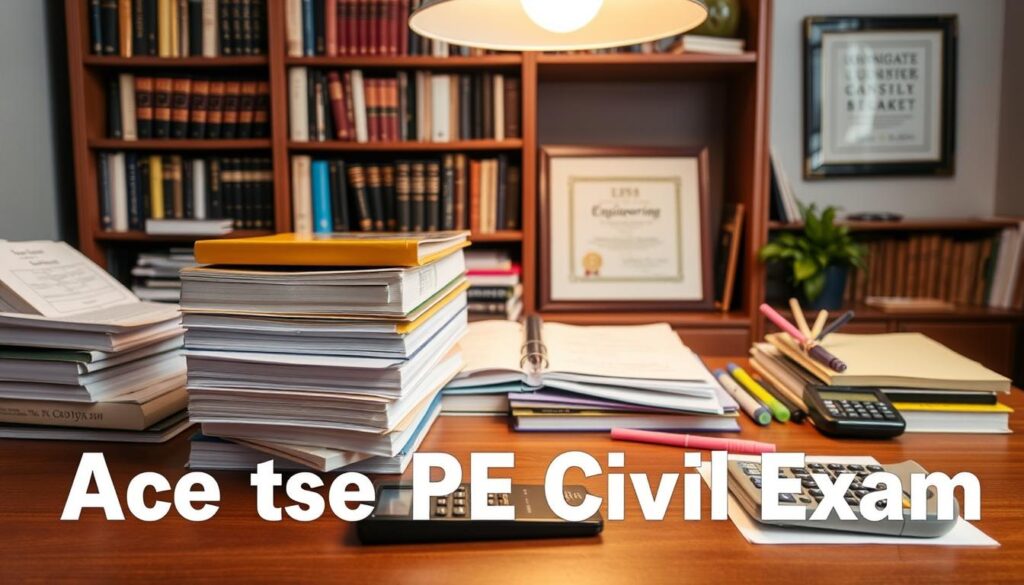Becoming a licensed professional engineer is a significant milestone in a civil engineer’s career, and passing the PE civil exam is a crucial step towards achieving this goal.
The PE civil exam is an 8-hour, 80-question test that assesses a candidate’s ability to apply engineering principles and practices to real-world problems in civil engineering. To succeed, it’s essential to understand the exam format, content, and the benefits of becoming a licensed professional engineer. Effective preparation is key, and with the right study materials and strategies, you can ace the exam and advance your career.
For more information on the requirements for a civil engineering license, it’s essential to understand the exam process and the resources available to help you prepare.
Key Takeaways
- Understand the format and content of the PE civil exam.
- Prepare effectively with the right study materials and strategies.
- Learn from the experiences of others who have passed the exam.
- Manage your time effectively during the exam.
- Stay focused and confident on exam day.
Understanding the PE Civil Exam Format
Understanding the format of the PE Civil Exam is crucial for effective preparation. The NCEES PE Civil Exam is a comprehensive assessment that tests a candidate’s knowledge in various civil engineering disciplines.
Exam Structure and Timing
The PE Civil Exam is divided into two main sections: breadth and depth. The breadth section covers general civil engineering topics, while the depth section focuses on a specific area of practice. Candidates have 8 hours to complete the exam, which is divided into two 4-hour sessions.
- The morning session (breadth) tests general knowledge.
- The afternoon session (depth) tests specialized knowledge in a chosen area.
Types of Questions and Topics
The exam consists of multiple-choice questions, with some versions including multiple-multiple-choice questions. The topics covered range from structural principles to transportation engineering.
Some of the key topics include:
- Structural analysis and design
- Geotechnical engineering
- Water resources and environmental engineering
Scoring and Pass Rates
The PE Civil Exam is scored on a pass/fail basis. The NCEES provides a detailed scoring guide, but essentially, candidates must achieve a minimum score to pass.
Pass rates vary by discipline and year, but understanding the exam format and content is key to achieving a passing score.
Creating Your Study Plan

A well-structured study plan is the foundation for passing the PE Civil Exam. To create an effective plan, you need to consider several factors, including setting realistic goals, managing your time efficiently, and identifying the right study materials.
Setting Realistic Goals
Setting achievable goals is crucial for maintaining motivation and tracking progress. Start by assessing your current knowledge level and identifying areas that need improvement. Break down your study sessions into manageable chunks, and set specific targets for each study session.
- Identify your strengths and weaknesses.
- Set specific, measurable, achievable, relevant, and time-bound (SMART) goals.
- Create a study schedule that aligns with your goals.
Time Management Techniques
Effective time management is critical for covering all the necessary material before the exam. Consider using the Pomodoro Technique, which involves studying in focused 25-minute increments, followed by a 5-minute break. Allocate your study time wisely, ensuring you cover all the required topics.
“Time is what we want most, but what we use worst.” – William Penn
To make the most of your study time, prioritize topics based on their importance and your familiarity with them. It’s recommended to spend approximately 300 hours studying for the PE Civil Exam.
Key Resources and Materials
Utilizing the right study materials is vital for effective preparation. The PE Civil Reference Manual is a highly recommended resource, providing comprehensive coverage of the exam topics. Supplement this with practice problems to reinforce your understanding and improve your problem-solving skills.
By combining a well-structured study plan with the right resources and time management techniques, you’ll be well-prepared to ace the PE Civil Exam.
Essential Topics to Focus On
To ace the PE Civil Exam, you need to have a solid grasp of several fundamental areas of civil engineering. The exam is designed to test your knowledge and skills in various disciplines. Understanding the key topics covered in the exam is crucial for effective preparation.
Structural Principles
Structural analysis is a critical component of the PE Civil Exam. It involves understanding the behavior of structures under various loads and conditions. You should be familiar with the principles of statics and dynamics, as well as the analysis of determinate and indeterminate structures.
For more resources on structural principles, you can visit PPI2PASS, which offers comprehensive study materials for the PE Civil Exam.
Geotechnical Engineering
Geotechnical engineering is another vital area, focusing on the behavior of earth materials and their interaction with structures. Key topics include soil mechanics, foundation design, and slope stability. It’s essential to understand the properties of different soil types and how they affect construction projects.
Transportation Engineering
Transportation engineering involves the planning, design, and operation of transportation systems. This includes understanding traffic flow, highway design, and transportation planning principles. Familiarity with design standards and guidelines, such as those provided by AASHTO, is also important.
Water Resources and Environmental Engineering
Water resources and environmental engineering cover a broad range of topics, including hydrology, hydraulics, and environmental regulations. You should be able to analyze water supply systems, wastewater treatment processes, and the environmental impact of engineering projects.
By focusing on these essential topics, you can ensure a comprehensive preparation for the PE Civil Exam. Understanding the key concepts and principles in each area will help you identify where you need to focus your studies.
Building a Strong Foundation

Establishing a robust foundation in civil engineering principles is crucial for success in the PE Civil Exam. A strong foundation not only enhances your understanding of complex concepts but also boosts your confidence during the exam.
Review of Fundamental Concepts
Reviewing fundamental concepts is the first step towards building a strong foundation. It’s essential to revisit the basics of civil engineering, including structural principles, geotechnical engineering, and transportation engineering. A thorough review helps in identifying areas where you need improvement.
- Revisit your notes and textbooks from college.
- Use online resources to refresh your memory on key concepts.
- Focus on areas where you feel weakest.
Importance of Practice Problems
Practice problems are a critical component of your PE Civil Exam preparation. They help you apply theoretical knowledge to real-world scenarios. By solving practice problems, you can:
- Improve your problem-solving skills.
- Enhance your understanding of complex concepts.
- Manage your time more effectively during the exam.
Utilizing a PE exam prep course that includes practice problems can be particularly beneficial. These courses often provide a structured approach to studying and offer valuable feedback on your performance.
Utilizing Online Resources
In today’s digital age, there are numerous online resources available to aid in your PE Civil Exam preparation. These include:
- Online forums and discussion groups.
- Video tutorials and lectures.
- Practice exams and quizzes.
By leveraging these resources, you can create a comprehensive study plan that suits your needs. Remember, a strong foundation is key to your success in the PE Civil Exam.
Effective Study Techniques
Understanding and applying effective study techniques can significantly improve your chances of success in the PE Civil Exam. By adopting the right strategies, you can enhance your retention, understanding, and recall of complex civil engineering concepts.
Active Learning Strategies
Active learning is a powerful approach to studying for the PE Civil Exam. It involves engaging with the material you’re studying, rather than just passively reading or listening. Techniques include summarizing notes in your own words, creating concept maps, and self-testing. Active learning strategies like these can help deepen your understanding and improve your ability to apply knowledge under exam conditions.
Group Study vs. Solo Study
Whether to study in a group or alone is a personal choice that depends on your learning style and preferences. Group study can be beneficial as it allows for the sharing of knowledge, discussion of complex topics, and mutual support. However, solo study provides the flexibility to focus on your weak areas and study at your own pace. Experimenting with both methods can help you determine what works best for you.
Flashcards and Mnemonics
Flashcards and mnemonics are effective tools for memorization. Flashcards can help you recall key terms and concepts, while mnemonics aid in remembering formulas, sequences, and other critical information. For example, creating a mnemonic device can help you recall complex engineering formulas. You can also find free resources to learn civil engineering that include pre-made flashcards and other study aids.
By incorporating these effective study techniques into your study plan, you can enhance your preparation for the PE Civil Exam and boost your confidence on exam day.
Taking Practice Exams

One of the most effective ways to assess your knowledge is by taking practice exams for the PE Civil Exam. This approach not only helps in identifying weak areas but also in familiarizing yourself with the exam format and timing.
Benefits of Simulated Testing
Simulated testing through practice exams offers several benefits. It helps in:
- Assessing your current level of knowledge
- Identifying areas that require more focus
- Improving your time management skills
- Enhancing your ability to handle exam pressure
By taking practice exams, you can significantly improve your chances of passing the PE Civil Exam. It’s a proactive approach to understanding your strengths and weaknesses.
Analyzing Your Practice Test Results
After taking a practice exam, it’s crucial to analyze your results. This involves:
- Reviewing the questions you got wrong
- Understanding the concepts behind those questions
- Noting down common mistakes
This analysis will help you refine your study plan and focus on areas that need improvement.
“The key to success is to focus our conscious mind on things we desire not things we fear.” – Brian Tracy
Adjusting Your Study Plan Based on Feedback
Based on your practice test results, you should adjust your study plan. This might involve:
- Spending more time on weak areas
- Adjusting your study schedule
- Seeking additional resources or help
By doing so, you’ll be able to optimize your study plan and improve your overall performance.
Test Day Preparation
The PE Civil Exam is a significant milestone, and being prepared for test day can make all the difference. It’s not just about knowing the material; it’s also about being in the right mindset and having everything you need to perform your best.
What to Bring on Exam Day
On the day of the exam, it’s crucial to bring all the necessary materials to the testing center. This includes your exam admission ticket, a valid form of identification, and any other materials specified by the exam administrators. For a comprehensive list of what to bring, you can refer to resources like PPI2Pass, which provides detailed guidance on exam day essentials.
Managing Test Anxiety
Test anxiety is a common phenomenon, but there are strategies to manage it. Preparation is key; the more you know what to expect, the less anxious you’ll feel. Techniques such as deep breathing, positive self-talk, and visualization can also help calm your nerves. It’s essential to arrive early at the testing center to get settled before the exam starts.
Arriving at the Testing Center
Arriving early at the testing center not only helps reduce stress but also gives you time to familiarize yourself with the surroundings. Take a few moments to review the exam format and instructions one last time. Being composed and confident can significantly impact your performance.
By focusing on these test day tips, you can ensure that you’re not only prepared academically but also mentally ready to tackle the PE Civil Exam.
Questions to Expect on the Exam

Understanding the types of questions on the PE Civil Exam is crucial for effective preparation. The exam is designed to test your ability to apply civil engineering principles to various scenarios.
Commonly Asked Questions
The PE Civil Exam includes a range of question types, such as multiple-choice, multiple-correct, and problem-solving questions. Multiple-choice questions test your knowledge of specific concepts, while problem-solving questions assess your ability to apply that knowledge to real-world problems.
Some examples of commonly asked questions include those related to structural analysis, geotechnical engineering, and transportation engineering. Familiarizing yourself with these topics can help you feel more confident on exam day.
Focus Areas for the Problem-Solving Section
The problem-solving section of the exam is particularly challenging, as it requires you to apply theoretical knowledge to practical scenarios. Key focus areas include:
- Structural analysis and design
- Geotechnical engineering principles
- Transportation engineering and traffic flow
- Water resources and environmental engineering
To excel in this section, it’s essential to practice solving problems related to these areas. Reviewing relevant formulas and practicing with sample questions can help you build confidence and improve your problem-solving skills.
Real-World Scenarios
The PE Civil Exam often includes real-world scenarios to test your ability to apply civil engineering principles in practical contexts. These scenarios might involve designing a bridge, analyzing soil stability, or developing a traffic management plan.
| Scenario | Relevant Topic | Skills Tested |
|---|---|---|
| Designing a retaining wall | Geotechnical Engineering | Analysis and design |
| Analyzing traffic flow | Transportation Engineering | Data analysis and planning |
| Developing a water treatment plan | Water Resources and Environmental Engineering | System design and environmental impact assessment |
By practicing with real-world scenarios, you can improve your ability to think critically and apply civil engineering principles to complex problems.
Tips for Question Strategies
Mastering the PE Civil Exam requires more than just knowledge; it demands effective question strategies. The exam’s format and timing can be challenging, but with the right approach, you can significantly improve your performance.
Reading Questions Carefully
One of the most critical strategies is to read each question carefully. Misinterpreting a question can lead to an incorrect answer, even if you know the material well. Take your time to understand what is being asked, and identify the key elements of the question.
It’s also helpful to identify the question type (e.g., multiple-choice, multiple-select) and be aware of any specific instructions or constraints provided in the question.
Elimination Techniques
Another effective strategy is to use elimination techniques. When faced with a multiple-choice question, try to eliminate obviously incorrect answers first. This increases your chances of selecting the correct answer from the remaining options.
Elimination techniques are particularly useful when you’re unsure of the answer. By reducing the number of possible answers, you can make an educated guess more confidently.
Time Allocation for Each Question
Effective time management is crucial during the PE Civil Exam. Allocate your time wisely among the questions. Generally, it’s a good idea to spend more time on questions that are worth more points or that you find more challenging.
Consider dividing your time into segments for different sections of the exam. This helps ensure that you have enough time to attempt all questions. Practice managing your time during mock exams to get a feel for how to pace yourself.
Post-Exam Reflection

Post-exam reflection is not just about assessing your performance; it’s also about strategizing for future success. After investing significant time and effort into preparing for the PE Civil Exam, taking a moment to reflect on your experience can provide valuable insights.
Analyzing Your Performance
Analyzing your performance involves more than just knowing whether you passed or failed. It’s about understanding your strengths and weaknesses, identifying areas where you excelled, and pinpointing topics that challenged you.
- Review your study materials and notes to identify areas that need more focus.
- Consider seeking feedback from peers or mentors who can provide an objective assessment of your performance.
- Use your exam experience to adjust your study plan for future exams or continuing education.
Next Steps After the Exam
Regardless of the outcome, there are several steps you can take after the exam to continue moving forward in your career.
| Outcome | Next Steps |
|---|---|
| Passed | Update your resume, notify your professional network, and begin applying for positions that require a PE license. |
| Did Not Pass | Analyze your performance, adjust your study plan, and retake the exam when you’re better prepared. |
Planning for Future Exams
For those who need to retake the exam, planning is key. This involves setting a realistic timeline for your next attempt, identifying additional resources or study materials you may need, and developing a more effective study strategy.
Key Considerations:
- Set specific, achievable goals for your next exam attempt.
- Utilize a variety of study materials, including practice exams and review courses.
- Join a study group or find a study buddy to stay motivated.
By reflecting on your exam experience and planning accordingly, you can improve your chances of success in future attempts.
Resources for Continued Learning
The field of civil engineering is constantly evolving, making continued learning a necessity. As new technologies emerge and industry standards change, professional engineers must stay informed to remain competent and advance in their careers.
Recommended Books and Materials
Several textbooks and reference materials are highly recommended for civil engineers looking to expand their knowledge. These include:
- Textbooks on structural analysis and design
- References on geotechnical engineering practices
- Publications on sustainable development in civil engineering
For those preparing for further certifications or looking to deepen their understanding of specific areas, these resources are invaluable. You can explore these resources further by visiting the ASCE Exam Preparation page for more information.
Online Courses and Workshops
Online courses and workshops offer flexible learning opportunities for busy professionals. Platforms such as Coursera, edX, and Udemy host a variety of courses relevant to civil engineers, from introductory classes to advanced specialized topics.
Some key areas covered by these courses include:
- Project management for engineers
- Advanced water resources engineering
- Transportation infrastructure planning
Professional Organizations and Networks
Joining professional organizations can provide access to a wealth of resources, including continuing education opportunities, industry events, and networking possibilities.
“Membership in professional organizations like the American Society of Civil Engineers (ASCE) can significantly enhance a professional engineer’s career through access to cutting-edge research, networking opportunities, and professional development resources.”
Some benefits of joining these organizations include:
- Staying updated on industry best practices
- Participating in conferences and seminars
- Engaging with a community of professionals for collaboration and knowledge sharing
Importance of Networking

As a civil engineer, building a strong network can significantly impact your career. Networking allows you to connect with other professionals, share knowledge, and stay updated on industry developments.
Expanding Your Professional Circle is crucial in today’s competitive job market. By engaging with other professionals, you can gain insights into best practices, new technologies, and innovative solutions.
Connecting with PE Exam Passers
One of the benefits of networking is the opportunity to connect with individuals who have passed the PE exam. They can offer valuable advice and insights into the exam process, as well as share their experiences.
By learning from those who have successfully navigated the exam, you can gain a better understanding of what to expect and how to prepare effectively.
Joining Study Groups or Forums
Joining a study group or online forum can be an excellent way to connect with others who are also preparing for the PE exam. These groups provide a platform to discuss challenging topics, share resources, and collaborate on practice problems.
Active participation in these groups can significantly enhance your learning experience and help you stay motivated throughout your study period.
Engaging with Professional Communities
Engaging with professional communities, such as the American Society of Civil Engineers (ASCE), can provide numerous benefits. These organizations offer access to industry events, continuing education opportunities, and networking events.
By being an active member of these communities, you can stay informed about industry trends, contribute to discussions on best practices, and expand your professional network.
Networking is not just about attending events; it’s about building meaningful relationships that can support your career growth. By connecting with others in your field, you can open yourself up to new opportunities, collaborations, and learning experiences.
Maintaining Your License After Passing
Passing the PE Civil Exam is a significant achievement, but it’s equally important to maintain your licensure through ongoing education and industry updates. To keep your license active, you must comply with the continuing education requirements set by your state’s licensing board.
Continuing Education Requirements
Continuing education is vital for staying updated on the latest technologies, codes, and best practices in civil engineering. Most states require PE license holders to complete a certain number of professional development hours (PDHs) or continuing education units (CEUs) within a specified period. It’s essential to check with your state’s licensing board to understand the specific requirements, as they can vary significantly.
Some of the common continuing education requirements include:
- Completing courses or workshops related to your field of practice
- Attending conferences or seminars
- Participating in online webinars or tutorials
- Self-directed study or research
Keeping Up with Industry Changes
The field of civil engineering is constantly evolving, with new technologies, materials, and methodologies being introduced regularly. Staying informed about these changes is crucial for maintaining your competence and providing the best services to your clients. You can keep up with industry changes by:
- Subscribing to industry publications and newsletters
- Following relevant professional organizations on social media
- Participating in online forums and discussion groups
- Attending industry events and conferences
Networking Opportunities for Civil Engineers
Networking is a valuable aspect of maintaining your professional license and advancing your career. By connecting with other professionals in your field, you can share knowledge, learn about new opportunities, and stay updated on industry trends. Some ways to network include:
- Joining professional organizations, such as the American Society of Civil Engineers (ASCE)
- Participating in local chapter meetings or events
- Volunteering for committees or task forces
- Attending industry conferences and seminars
By focusing on continuing education, staying current with industry changes, and leveraging networking opportunities, you can maintain your PE license and continue to grow as a professional in the field of civil engineering.
Real-Life Success Stories
Hearing from others who have passed the PE Civil Exam can be a great motivator and provide valuable insights into the preparation process. Many successful engineers have shared their experiences, offering testimonials and preparation tips that can help you achieve your goals.
Lessons from Achievers
Engineers like Jon Magnusson, who became CEO of Magnusson Klemencic Associates at 34, have demonstrated exceptional professional growth. Magnusson Klemencic Associates has led projects worth over $73 billion. Other pioneers, such as Nora Stanton Blatch Barney, the first female inductee of the American Society of Civil Engineers, have paved the way for future generations.
Preparation is Key
Angelina Jay, who earned her Ph.D. in civil engineering from Northeastern University, is a testament to the importance of dedication and hard work. The U.S. Bureau of Labor Statistics projects an 11-percent growth in demand for civil engineers between 2016 and 2026, making it a promising career path.
By learning from these success stories and testimonials, you can gain valuable preparation tips and insights to help you succeed in your own PE Civil Exam journey.
